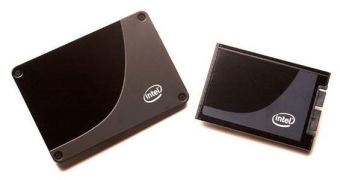While most Intel-related news has been revolving around its future central processing units, the Santa Clara company is already known for more than being the largest maker of CPUs, as it also makes core-logic sets, graphics adapters and Wi-Fi controllers, among other types of processors. Currently, Intel also claims to be the biggest supplier in the US retail SSD market and the second largest worldwide. This, however, seems to be only the beginning, as Intel has recently expressed its intention to become the foremost SSD player.
According to EETimes, while Intel does not seek to be the greatest on the discrete market, it does want to take Samsung's place as the top SSD supplier. The Santa Clara chip giant supposedly wants to avoid engaging in a “market share game” against Hynix, Samsung and Toshiba, as far as the NAND chip sector is concerned. Still, the company sees SSDs as ripe for the taking, even having already planned on introducing a new range of products based on the 25nm process, which it jointly developed with Micron.
“We want to be a leader in SSDs. We want to bring SSDs out of the niche markets and into the mainstream,” Tom Rampone, the general manager of Intel's NAND solutions group, said, EETimes reports. “We do view NAND as a growth business. It is not strategically important to be the number No. 1 (in terms of market share.) Our focus is on technology. Technology leadership is our focus.”
Analysts forecast that, even though the SSD market doesn't directly threaten the HDD segment, the latter will gradually decline as the former rises, since SSDs are superior to hard disks through the lower power consumption, improved performance and lower complexity. Intel believes that its hold on this segment will rise along with the popularity of solid state drives, mainly due to the company's joint venture with Micron, which, through using the most advanced process technology, will propel SSD shipments and bring profits at the same time.

 14 DAY TRIAL //
14 DAY TRIAL //